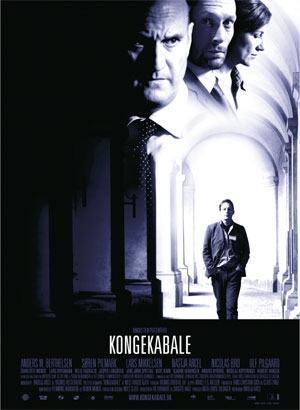
KING’S GAME (KONGAKABALE))
Denmark, 2004, 103 minutes, Colour.
Anders W. Berthelsen, Soren Pilmark.
Directed by Nicolaj Arcel.
It is meant as a compliment when this film is described as a small-scale Scandinavian Woodward and Bernstein story. This is a film about journalism and politics, about dirty tricks and integrity.
The author of the novel on which the film is based, Niels Krause- Kjoer, a political journalist, served as a spin-doctor to the Danish conservative party for a year in 1997. Since leaving politics, he has written a number of books and lectures at universities. He has consolidated a strong reputation which makes the characters and events in The King’s Game credible – and, he says, are based on his experiences as well as what might well have happened.
The tone of the film is Scandinavian but audiences will have little difficulty in making the parallels with political happenings in their own countries.
The setting is an election, the leader of the opposition injured in a car accident, the manouevring of an ambitious deputy and the press liaison to discredit his main rival (a liberal woman) and a succession of leaks and manipulating journalists. The audience identifies with an earnest reporter who is given the political round, fed a story which he uses and who then follows up to unravel the plot and unmask the villains.
At first the screenplay is quite critical of journalists and the cosy relationships with politicians. But, it is the media proprietors and editors who are mainly at fault because of their deals with the powers that be. And, so, it is the duty of honest journalists to expose corruption and work for justice.
The film is well-plotted, the characters and situations credible and, because of the tension of the move towards election day, the screenplay generates suspense. Anders W. Berthelsen (Italian for Beginners, Blinded) makes the earnest journalist a sympathetic hero and Soren Pilmark is more than sinister as the scheming politician. This is a solid and intelligent drama that will interest adult audiences.
1.The tradition of political thrillers? Journalistic thrillers? Films like All the President’s Men and their influence? Comparisons, similarities, differences?
2.Denmark, its politics, history? Its place in Europe, Scandinavia? The impact of this film for Danish audiences? European, worldwide?
3.The Copenhagen settings, the political world, rallies, boardrooms? Newspapers? Television studios? Homes? The musical score?
4.The title, politics, rulers? The author’s experience of politics and spin?
5.The prologue, the rally, the support of the politician, hopes, the sudden crash? The political situation, the hospitalisation? The prospect of the election, the short number of days? The state of the party, in opposition, the internal struggles for leadership? Strategies, public relations?
6.The importance of the elections and the dramatic tension, the passing of the days?
7.The party, the reaction, public statements, the media? Lone, the prospect of her leadership, more liberal, party antagonism? Her adviser and her strategies? The tactics in the boardroom, the man presiding, trying to delay Lone’s election as chairman? The sympathy for the hospitalised politician? Lone and her husband, his work, depression, the hospital in Cambodial, the use of the funds, his lack of ability as manager? His and her vulnerability? Erik, his place on the board, the meetings, his allies, the press officer and his scheming for him? The strategies and dirty tricks?
8.The politician and his being brain dead, this being concealed? His death? His wife in hospital, her wanting to know? Erik and his visits? The absence of the son and his antagonism towards his father? His girlfriend? Erik and his relationship with his secretary, using her, meeting the son at the airport? The ban on news?
9.Ulrik and his career, his relationship with his wife, family? His father’s reputation, everybody speaking about him, memories of his politics, big business? his father’s attitude, on-side with the dirty tricks, the party thinking that he would put pressure on his son? The meetings with the editor, the boss, getting the political round, his enthusiasm? His wife as a nurse, her friends at the hospital, the ability to get some information about the state of the politician’s health, Ulrik counting on the friendship and getting the information?
10.The portrait of the press corps, their toadying to the politicians? Molle, the eccentric, his critique? The public relations man, smooth, singling out Ulrik, planting the story? Ulrik and his investigations, publishing it on the front page? The editor being pleased?
11.The consequences of his article, Lone’s husband and the depression, his suicide, the news given to Lone during a meeting, the funeral? Ulrik and his further investigations, the story published by other papers about the extravagant holidays, the fact that the information was erroneous? The repercussions for Lone personally, her political career?
12.Ulrik’s continued suspicions, trying to visit the politician in the hospital, his wife, visiting his son and getting the false story? The father and his complicity with the editor? Molle and his giving him information, the relationship between the editor and Erik from the past? Going to the hospital?
13.The interrogation of the son, his false story, being delayed in Argentina, actually in Copenhagen? The interrogation of his girlfriend? Following leads, the pretence in getting the surveillance tapes? Realising that the woman was Erik’s secretary, the confrontation, her fears, giving them the information and documents?
14.Erik and his further tactics, the meetings, his public face, always a step ahead of the press? The funeral? His feeling secure? Going for the television interview?
15.The television interviewer, his integrity, Ulrik and Molle and their persuading him if they got the information to expose Erik? Their waiting in the corridor, the film not showing the interview with Erik? People coming out, the comments?
16.Investigative journalism, honesty, politicians and spin, manipulating journalists, old friendships and debts? Justice, commitment to work?
17.The end, the cynical touches, Erik’s being unmasked – but his later election and being a European Commissioner?